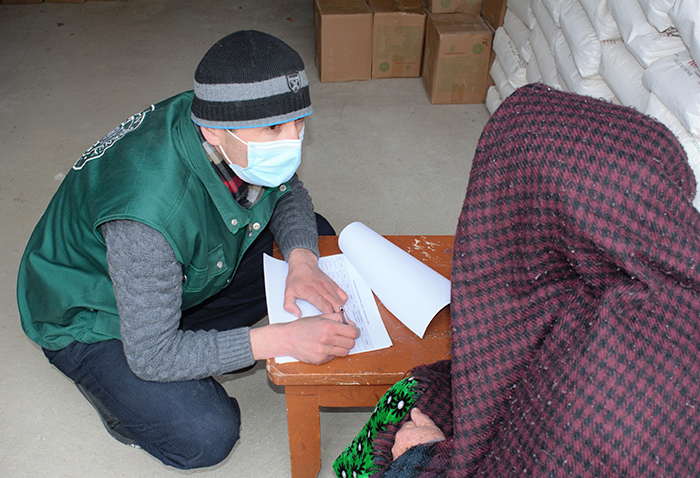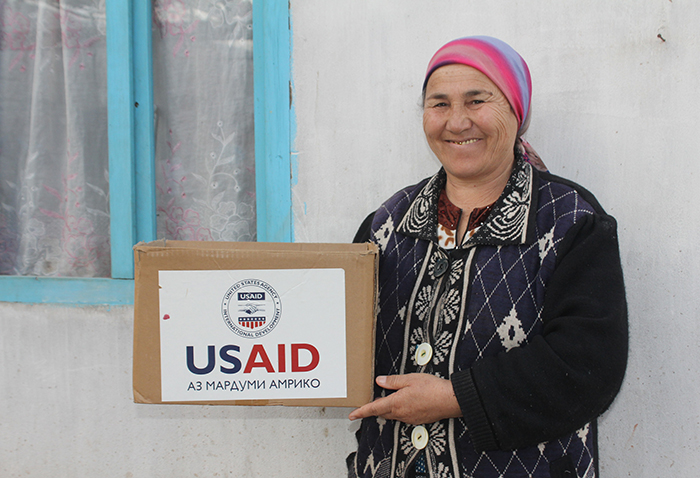As trucks carrying food packages reached Tajikistan’s Bartang Valley in late 2020, the residents of Basid village made their way to the food distribution point. Among them was 64-year-old Avalbegim Javmamadova.
Avalbegim, a single mother of four children, was born in Basid and has lived there her whole life. She is unemployed and spends her free time knitting Pamiri socks for her family. Avalbegim lost her husband many years ago and has navigated many challenges since then as she raised her four sons by herself. However, the COVID-19 pandemic created challenges that Avalbegim needed help to overcome.
A Crisis Multiplied
When the pandemic reached Tajikistan in 2020, it created not only a health crisis, but also a major economic slowdown. Avalbegim’s family was among the thousands of households that experienced a drastic decrease in income which jeopardized their food security.
Avalbegim’s sons do not have stable jobs and usually travel to Khorog, the city center of Gorno-Badakhshan Autonomous Oblast (GBAO) for seasonal jobs in construction. These temporary jobs allowed them to buy food and other essentials for their household.
“But after the spread of coronavirus, me and my brothers lost the only income we have to buy essential food and pay for other expenses,” one of Avalbegim’s sons explained. “The price for food is getting higher every day, making it difficult for us to afford it.”
Much of Tajikistan’s food supplies, especially grains, are imported from its neighbors, including Russia, Kazakhstan, Kyrgyzstan and China. As COVID-19 pandemic forced countries to close their borders, food supplies and quality decreased. At the same time, food prices increased drastically.
Many families across Tajikistan, including Avalbegim’s family, began to experience food insecurity and malnutrition. According to a World Bank survey from May 2020, more than 41 percent of households in Tajikistan reported having to reduce their food consumption.
Stepping into the Gap
Local Impact: A Transformative New Partnership in Asia and Africa stepped in to meet Avalbegim and her community’s immediate need for food.
From November to December 2020, the Local Impact project worked with the Aga Khan Agency for Habitat (AKAH) to distribute food baskets and hygiene kits to 29,500 households across the GBAO and Khatlon region of Tajikistan. A joint initiative of the United States Agency for International Development and the Aga Khan Foundation, Local Impact is working to build resilience in communities in Tajikistan and mitigate the negative impacts of the COVID-19 pandemic.

Registering a recipient of food assistance in Khorog, December 2020

Abdurahimova R. from Farkhor district with her food package
“When my sons and I came to the distribution point to receive the food and hygiene kits, my eyes were filled with tears, tears of happiness and hope,” Avalbegim said.
“This support means so much to us, it gives us hope that we are not alone in this difficult situation and that despite us living in this remote area, we are seen, heard and supported."
Food distribution is part of the overarching support provided by Local Impact, AKAH, and other Aga Khan Development Network (AKDN) agencies, in partnership with the development community, to support the Government of Tajikistan’s pandemic response. In addition to meeting the immediate need for food and household essentials, Local Impact is also raising public awareness of how to reduce the spread of the coronavirus and helping rural communities connect with medical experts through telemedicine.
“This project provided very timely support… during the most difficult time for people during the pandemic,” said Yogdor Fayzov, the governor of GBAO. “During COVID-19, access to nutrition, food, and hygiene items become [a] key priority… support to [the] 10,382 most vulnerable community members by [the] project saved many lives.”